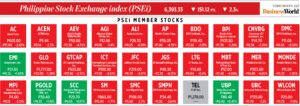No evidence riders get minimum wage through gig labor — report

Gig workers in the Philippines “face low pay and dangerous conditions,” according to a report that ranked nine of the most popular digital labor platforms in the country.
According to the Fairwork Philippines 2022 report, there is no evidence that drivers and riders earn at least the daily minimum wage of P537 per day ($US 9.70) after work-related costs despite gigging for top digital platforms — namely, Angkas, Borzo (formerly Mr. Speedy), Foodpanda, Grab Car, Grab Express, Joyride, Lalamove, TokTok, and Transportify.
The baseline report, launched on Aug. 9, assessed these platforms against its five principles of fairness (fair pay, fair conditions, fair contracts, fair management, and fair representation), giving each a fairness score out of 10.
Of the gig economy platforms rated, GrabCar and GrabFood/Express topped the ranking with 3 points out of 10, followed by Angkas and Lalamove with 2 points each. The remaining companies could not provide evidence of the minimum standards of fair work.
“When platforms are not scored, it does not necessarily mean they do not provide these particular principles,” said Cheryll Ruth R. Soriano, the principal investigator for Fairwork Philippines and a professor of the department of communications at De La Salle University. “It means that we lack evidence to score… that these platforms are indeed offering these particular services.”
Workers, lured by the opportunities and promises of the platform economy as a viable source of income, take on debt to buy cars and motorcycles — only to default on loans.
“We’ve talked to a few workers na nahatak yung kanilang mga sasakyan, lalo na nung pandemic, na wala namang safeguard [We’ve talked to a few workers whose cars have been towed away, especially since the conditions prevailing in this pandemic offer no safeguards],” said Ms. Soriano. “Hindi na nila mahulugan dahil hindi naman talaga ganun ka-stable ang kita sa gig work [They couldn’t make the regular loan payments because gig work isn’t that stable].”
Platform workers may seem to be earning well but after fixed capital costs, onboarding costs (including uniforms and insulated bags), and mobile data costs, “they’re actually in an economically precarious situation,” she said.
Over 400,000 Filipino workers fall under this gig economy classification. As with many other platform workers worldwide, their status as independent contractors rather than employees disqualify them from social protections provided under Philippine labor laws.
Among these benefits is health insurance. Although some platforms provide accident insurance and safety mechanisms, others ask workers to get their own. It is common for workers to crowdsource resources in social media groups when they fall ill or get into an accident.
The report’s other findings are as follows:
None of the nine platforms demonstrates their workers are guaranteed to be paid the minimum wage after costs.
Only four platforms (GrabCar, GrabFood/GrabExpress, Angkas, and Lalamove) could evidence practices to protect workers from risks associated with their jobs.
Many platforms operating in the Philippines need to do better when providing a basic level of fairness in their contracts. Some excluded liability on the part of the platforms. Four (GrabCar, GrabFood/GrabExpress, Angkas, and Lalamove) have clear terms and conditions, in a language comprehensible to the workers.
Two platforms (GrabCar and GrabFood/GrabExpress) were evidenced to have precise communication mechanisms for workers to meaningfully appeal low ratings, payment issues, deactivations, and other penalties and disciplinary actions.
There was no evidence that any of the studied platforms assured freedom of association and the expression of a collective worker voice. Neither was their proof that any of the platforms supported democratic governance.
Data was collected using desk research, as well as worker and manager interviews from the nine different platforms.
“This promotion of platform labor as an opportunity needs to be matched with ample protections and safeguards so workers do not fall into economically precarious conditions,” said Ms. Soriano.
Fairwork is a project based at the Oxford Internet Institute, University of Oxford, financed by the Federal Ministry for Economic Cooperation and Development, and commissioned by the Deutsche Gesellschaft für Internationale Zusammenarbeit. The project evaluates the work conditions of digital labor platforms in the platform economy.
“Some platforms scored better than others,” said Adam Badger, a postdoctoral researcher at Fairwork’s UK team. “That means better practice is possible, and that platforms can improve on those practices. It’s not all a sad story.”
The Philippine platform economy report will be updated yearly. — Patricia B. Mirasol




